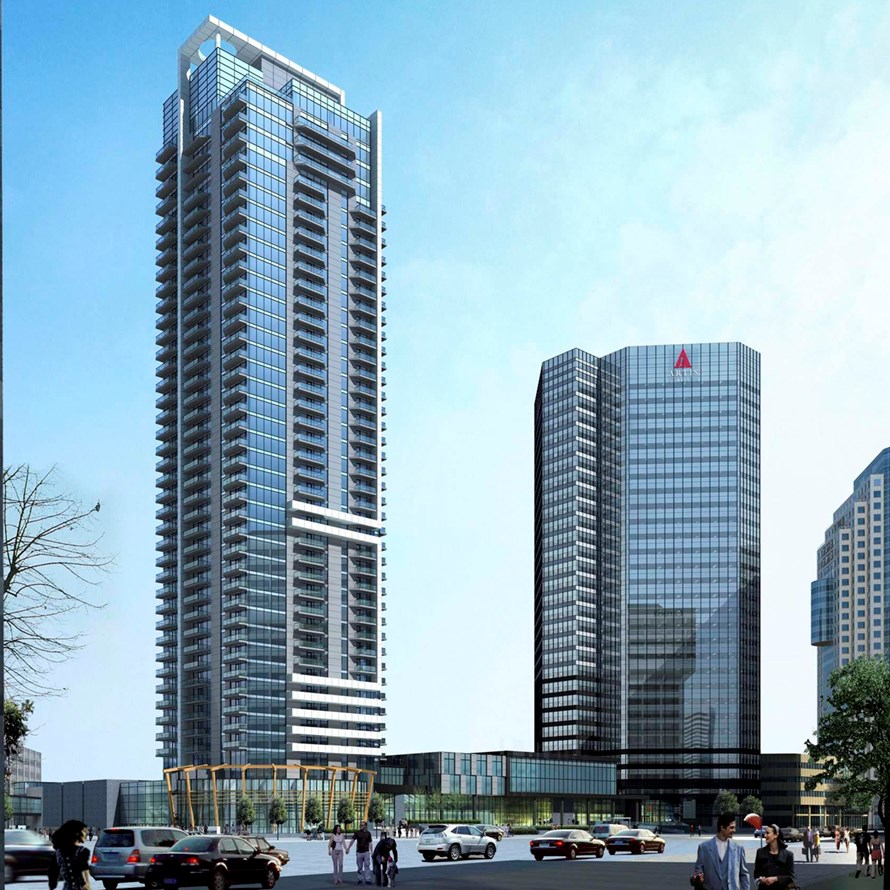A new 40-storey mixed-use apartment tower has begun ascending and will assume the title as Winnipeg’s tallest building when it’s completed in a couple of years, leaving the current record holder – 33-storey 201 Portage – quite literally in its shadow.
The $160 million tower isn’t coming out of the ground like most projects of this scale; instead it’s being built on top of the Shops of Winnipeg Square mall just a stone’s throw from Portage and Main.
Featuring 400 apartments, it will also have common space on the upper floor, meeting rooms and a mix of office and retail space.
“We wanted to build a landmark apartment building that would differentiate from anything else in the city. It will be quite luxurious with spectacular views overlooking The Forks [the confluence of the Red and Assiniboine rivers]. Being tall is important,” said Frank Sherlock, executive vice-president of property management at Artis Real Estate Investment Trust.
Dayna Spiring, president and CEO of Economic Development Winnipeg, said putting apartments at the city’s most famous corner was the next logical step and was probably long overdue.
“We’ve built Portage and Main up to be the epicentre of the business community. Putting residential on that corner and building it out is a great opportunity. We have people who will live and work downtown, and when you have that kind of concentration at that corner, it’s a good thing for the city,” she said.
Things are hopping just a couple of blocks away in the city’s historic Exchange District. Technology and digital media companies are hiring people and taking over significant amounts of real estate.
Ubisoft Entertainment, for example, a France-based video game developer, recently cut the ribbon on its new space in the historic Merchants Building. It already has 25 employees – one- quarter of what it predicts it will ultimately have within five years - and plans to invest $35 million in the province.
Food delivery service SkipTheDishes has also been gobbling up space at an alarming rate. It has operations in five different buildings and is hiring 175 people a month.
All indications are development is going to continue at an impressive pace, as the value of building permits in Winnipeg has hit record levels annually for two straight years.
“We’ve seen the momentum shift in this city with what we’ve built and are investing in. It’s not just keeping the lights on. We’re investing in becoming a world-class city,” Spiring said.
A share of that investment is in the office sector, which analysts expect to “be very active” this year after more than 50,000 square feet of space was leased up in the last half of 2018. Coming to the downtown is a 57,000-square-foot office complex in Sterling Business Park, where nearly half the Class A space has been pre-leased.
Winnipeg’s overall office vacancy rate is 8.9 per cent, but it has tightened to 5 per cent in the suburbs, according to a joint survey by Cushman & Wakefield and Stevenson.
Industrial
Winnipeg’s industrial sector has become a victim of its own success. With the vacancy rate falling to a seven-year low of 2.7 per cent amidst a lack of new product, a recent city hall study found that not enough serviced land is being readied to meet demand. The report, prepared in 2018, estimated that Winnipeg has less than 50 acres hooked up to the necessary infrastructure, compared to nearly 300 acres in nearby municipalities.
As city land becomes scarce and costly, vacant land is opening up in several locations on the outskirts of the city offering more affordable, shovel-ready industrial sites, according to Colliers International.
Industrial space is being taken up at a pace of about 50,000 square feet per month. While 450,000 square feet of new industrial space is expected to open or begin construction this year, “it will be some time before industrial supply will meet demand,” Colliers cautioned.
High construction costs may keep some speculative plays in check, analysts note. Altus Group estimates that the hard construction costs for a Winnipeg warehouse range from $80 per square foot to $115 per square foot, tied with Calgary as the second most expensive in Western Canada.
Industrial property values are also rising: based on large recent transactions, Winnipeg industrial property is selling for an average of $116 per square foot.



